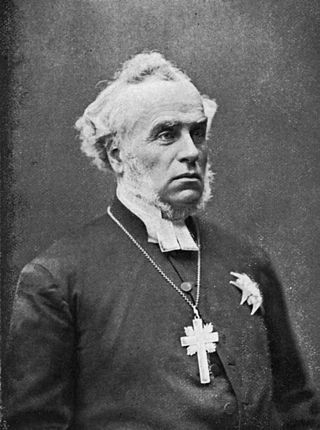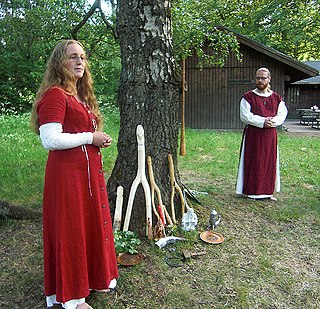Related Research Articles

Gunnar Valfrid Jarring was a Swedish diplomat and Turkologist.

Erling Eidem was a Swedish theologian who served as archbishop of Uppsala 1931–1950.

Anton Niklas Sundberg was a Lutheran clergyman, and the Church of Sweden archbishop of Uppsala 1870–1900.

Paul Petter Waldenström was a Swedish lecturer, priest in the Church of Sweden and theologian, member of the Riksdag, and writer, who became the most prominent leader of the free church movement in late 19th-century Sweden.

The Community of Forn Sed Sweden, formerly the Swedish Asatro Community is a heathen organization founded in 1994.

Yngve Torgny Brilioth was a Swedish theologian, professor for church history and author who served as Bishop of Växjö from 1938 to 1950 and Archbishop of Uppsala from 1950 until 1958.

The Swedish Evangelical Mission (SEM) is an independent, low-church, New Evangelical movement within the Church of Sweden. Described as "middle-of-the-road" due to maintaining its independence within the church while not separating from it, the association emphasizes the importance of lay involvement and is rooted in 19th-century Swedish revivalism and the Mission Friends movement.

The Uppsala Synod in 1593 was the most important synod of the Lutheran Church of Sweden. Sweden had gone through its Protestant Reformation and broken with Roman Catholicism in the 1520s, but an official confession of faith had never been declared.
Eric Segelberg was a Swedish theologian, professor, and a priest of the Lutheran Church of Sweden.

Fredrik Modéus is a Swedish theologian and bishop, currently the 59th Bishop of Växjö.

Claes Annerstedt was a Swedish historian and librarian.

Ernst Harald Riesenfeld was a Swedish theologian and Bible scholar, best known for his exegesis of the New Testament.

Nils Ivar (Nils-Ivar) Carlborg was a Swedish Army officer. He started the paratrooper training in Sweden and founded the Swedish Army Paratroop School of which he was its first commander (1952–1953). He later served as head of the Military Academy Karlberg (1964–1969) and as commander of Stockholm Defence District (1969–1973) and as the Commandant of Stockholm (1969–1973).

Peter Lorenz Sellergren was a Swedish Lutheran priest, theologian, and gammalkyrklig revivalist preacher.
Pro Fide et Christianismo is a Christian association within the Church of Sweden. The organization was an "informal or semi-official national school board" prior to the founding of Sweden's public education system and made a significant impact on Sweden's early education system.
Alf Henry Tergel was a Swedish church historian.

Ragnar Hugo Ferdinand Gyllenswärd was a Swedish jurist who served as a justice of the Supreme Court of Sweden for 23 years, including six years as its president. Gyllenswärd started his academic career at Uppsala University with studies in the humanities before obtaining a law degree. He worked in various legal roles, including contributing to legislative matters at the Ministry of Justice and helping draft a Swedish-Norwegian water rights convention. He later served on a committee revising inheritance law and contributed to reforms related to death declarations. Gyllenswärd held several significant positions, including Parliamentary Ombudsman and Supreme Court Justice, where he was recognized for his legal expertise and commitment to maintaining and developing legal standards. He was also engaged in historical studies, particularly in personal and cultural history.
References
Notes
- ↑ "Oloph Bexell". Swedish Film Database (in Swedish). Retrieved 2022-10-27.
- ↑ Brodd, Sven-Erik (1995). "Kyrkovetenskapliga forskningsfålt" (PDF). Halvårsskrift for praktisk teologi (in Swedish). 12 (1). Luther Forlag. Archived (PDF) from the original on 2022-10-27. Retrieved 2022-10-27.
- ↑ Bexell, Oloph (2014). "Från praktisk teologi till kyrkohistoria: Tillbakablickar och reflexioner". Svensk Teologisk Kvartalskrift (in Swedish). 90. Archived from the original on 2022-10-27. Retrieved 2022-10-27.
- ↑ "När enhetskyrkan gick i graven". Signum (in Swedish). 2021-03-01. Archived from the original on 2022-05-22. Retrieved 2022-10-27.
- ↑ "Ny bok ger insyn i teologiutveckling i Svenska kyrkan". Världen idag (in Swedish). 2021-07-10. Archived from the original on 2022-10-27. Retrieved 2022-10-27.
- ↑ Corpus Christianorum Conciliorum Oecumenicorum Generalumque Deceta. Editio critica VI/1/2 Synods of the Christian Churches of and after the Reformation. The Dawn of the Reformation (16th–17th Centuries). Part 2. Ed. A. Melloni. Brepols 2024
- ↑ Moen, Ann, ed. (2007). Vem är det (in Swedish). p. 68.
- ↑ "Nu skriver han på det nya psalmlexikonet". Upsala Nya Tidning (in Swedish). Retrieved 2022-10-27.
- ↑ Harnesk, Paul, ed. (1965). Vem är vem (in Swedish). Bokförlaget Vem är vem AB. p. 128. Archived from the original on 2022-10-27. Retrieved 2022-10-27.
Sources
- Jönsson, Lena, ed. (2001). Vem är det (in Swedish). Stockholm: Kunskapsförlaget, P. A. Norstedt & Söner. p. 129. ISBN 9789172850422. ISSN 0347-3341 . Retrieved 2022-10-27– via Project Runeberg.